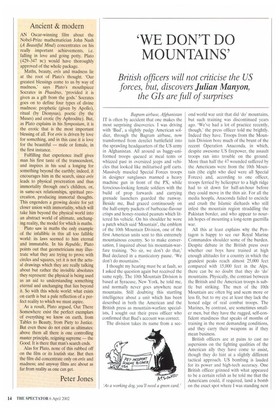Ancient & modern
AN Oscar-winning film about the Nobel-Prize mathematician John Nash (A Beautiful Mind) concentrates on his really important achievements, i.e. falling in love and going potty. Plato (429-347 BC) would have thoroughly approved of the whole package.
Maths, beauty, eras and madness lie at the root of Plato's thought. 'Our greatest blessings come to us by way of madness,' says Plato's mouthpiece Socrates in Phaedrus, 'provided it is given as a gift from the gods.' Socrates goes on to define four types of divine madness: prophetic (given by Apollo), ritual (by Dionysus), poetic (by the Muses) and erotic (by Aphrodite). But, as Plato explains in his Symposium, it is the erotic that is the most important blessing of all. For eras is driven by love for something, and in this case it is love for the beautiful — male or female, in the first instance.
Fulfilling that experience itself gives man his first taste of the transcendent, and inspires in his soul a longing for something beyond the earthly; indeed, it encourages him in the search, since ere's leads to physical procreation and thus immortality through one's children, or, in same-sex relationships, spiritual procreation, producing immortal thoughts. This engenders a growing desire for yet closer union with immortality, which will take him beyond the physical world into an abstract world of ultimate, unchanging reality, the model for which is maths.
Plato saw in maths the only example of the infallible in this all too fallible world: its laws seemed to him eternal and immutable. In his Republic, Plato points out that geometricians may illustrate what they are trying to prove with circles and squares, yet it is not the actual drawings which they are really talking about but rather the invisible absolutes they represent: the physical is being used as an aid to understanding something eternal and unchanging that lies beyond it. So with this whole world: what exists on earth is but a pale reflection of a perfect reality to which we must aspire.
As a result, Plato argued, Out There Somewhere exist the perfect exemplars of everything we know on earth, from Tables to Beauty: from Piety to Justice. But even these do not exist as ultimates: above them all there is one controlling master principle, reigning supreme — the Good. It is there that man's search ends.
Alas for Plato, none of this rubbed off on the film or its loutish star. But then the film did concentrate only on eras and madness; and anyway films are about as far from reality as one can get.






























































 Previous page
Previous page